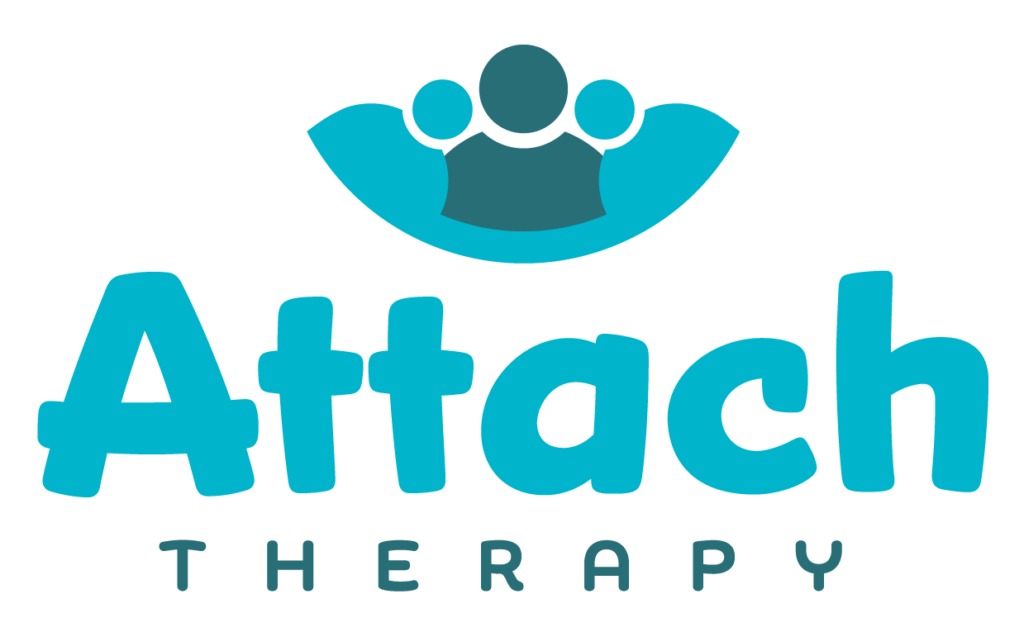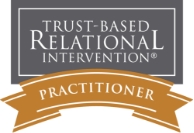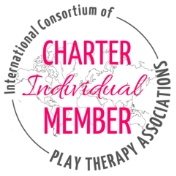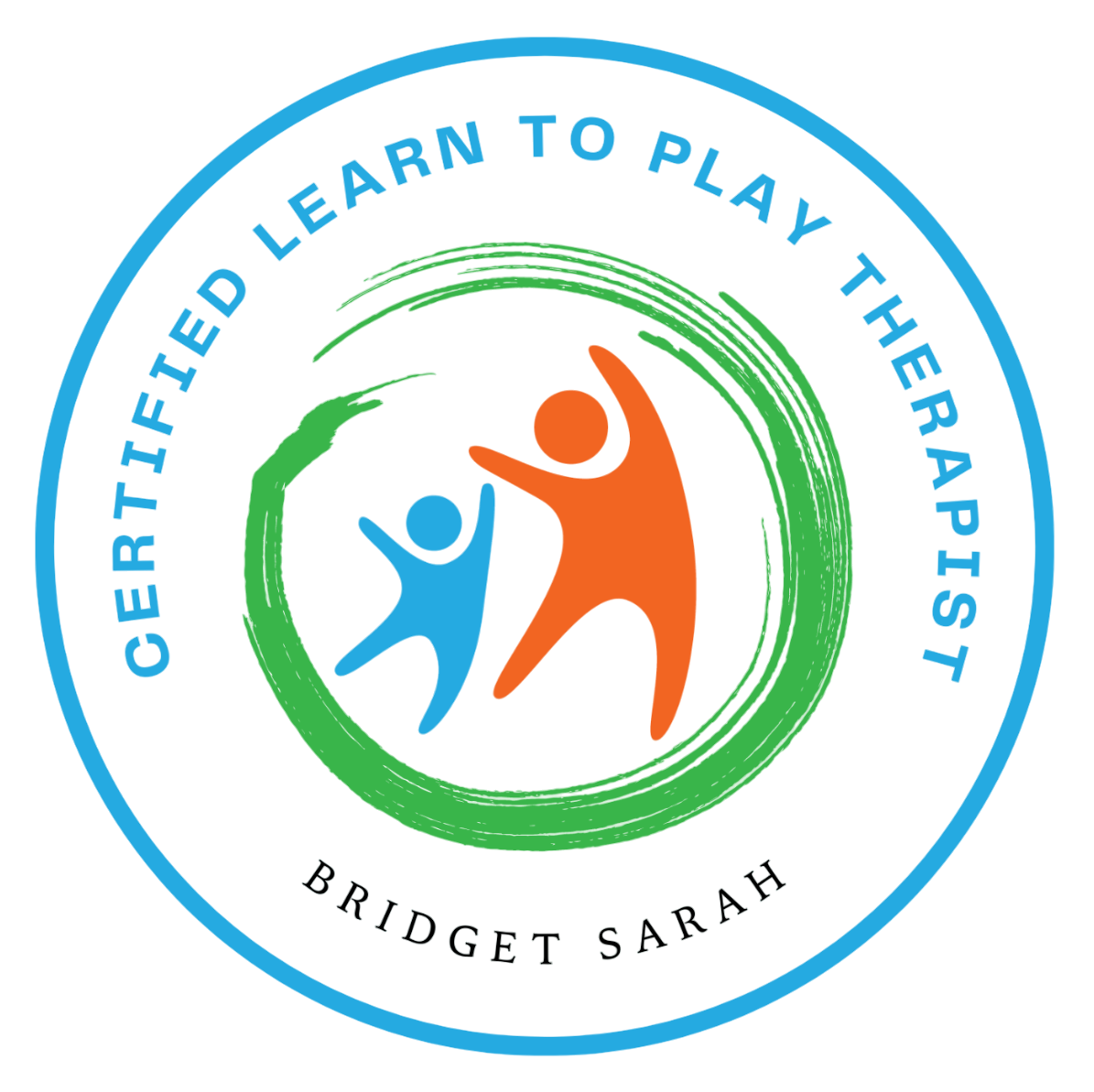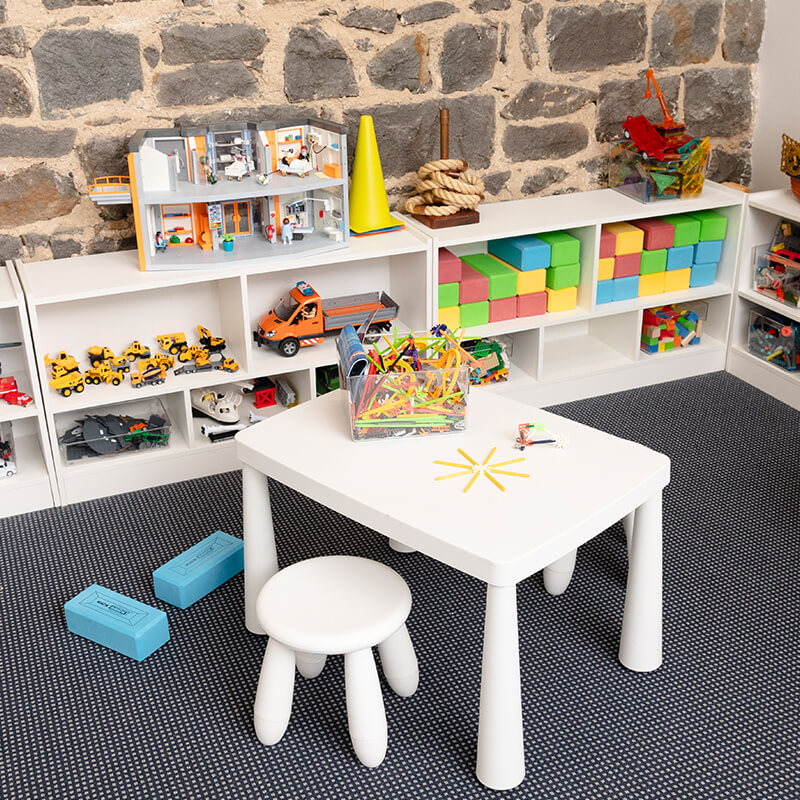
Services
Play Therapy
Play is as natural to children as breathing! It is their natural and unique language. Play is essential for promoting normal child development and has therapeutic powers, the specific change agents in which play initiates, facilitates, and strengthens the therapeutic effect.
When we connect with children through play, play becomes an antidote to fear, anxiety, and anger. When fear, anxiety and anger are disarmed, the brain is primed for learning.
Modalities used at Attach Therapy
At Attach Therapy following intake, we design a therapeutic intervention to meet your child’s unique needs.
This is reviewed and adjusted as required to meet your goals and hopes for therapy. A single play therapy modality or an integrative approach combing various modalities may be implemented based on referral reason.
Modalities used at Attach Therapy
At Attach Therapy following intake, we design a therapeutic intervention to meet your child’s unique needs.
This is reviewed and adjusted as required to meet your goals and hopes for therapy. A single play therapy modality or an integrative approach combing various modalities may be implemented based on referral reason.
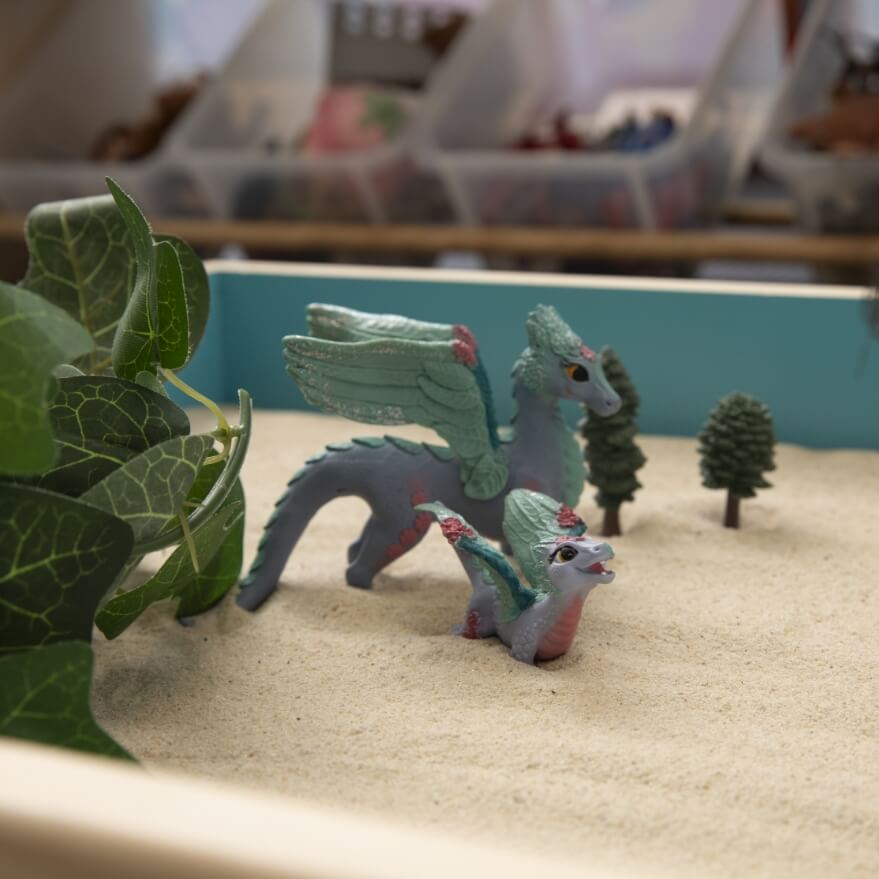
Humanistic
(Non-Directed Play Therapy)
Humanistic play therapy is a one-to-one therapy which allows children to express themselves in the way they choose and to learn strategies for coping in their daily life.
Non-directive play therapy (Humanistic) is an evidence-based way of working with children therapeutically. It is person-centred approach and is grounded in the concept that play is the universal language for children, where expression of thoughts and feelings can occur without words. It is culturally and developmentally sensitive as an intervention for various presenting issues and is a grounded approach for counselling children.
In Humanistic play therapy the child is welcomed into the playroom where the objective is self-direction and awareness by the child, in an environment where the therapist minimally directs the play, so children can talk or play out issues of their choice. The child is permitted to express verbally or non-verbally as they choose. The playroom environment is well stocked with a variety of toys, and as the child plays, the therapist tracks (narrates) and empathically reflects the child’s thoughts and feelings, believing when a child’s thoughts and feelings are accepted, they then accept, and work on them. Humanistic play therapy allows the child to determine the thoughts and feelings they need to work on, whilst the therapist formulates hypotheses, gathering evidence related to the child’s play.
Continuous assessment in sessions allows the therapist to compare what an individual child is doing, and saying compared with developmental levels, other children of similar ages and in similar environments.
This therapeutic approach is suited to children who may have difficulty verbalising their needs, thoughts and feelings, and children with social and emotional difficulties. Humanistic has been noted to be effective for releasing anxiety, improving desirable social behaviours, sense of self, emotional regulation, wider social and emotional capacity, decreasing externalising behaviours, and building resilience.
Ideally sessions are weekly but can be fortnightly. Short term interventions are between 10 and 25 sessions, whilst long term intervention for children with complicated difficulties extend beyond this. As part of your child’s therapeutic journey, a review will be scheduled every 4-6 weeks for short term interventions and 8-10 weeks for longer term interventions.
Learn to play
(Directed Play Therapy)
Learn to Play is a specific modality where a child’s play abilities are assessed and then supported to close the gap with any developmental delays.
Learn to Play (LTP) was developed by Emeritus Professor Karen Stagnitti for children up to 10 years with developmental delays, language disorders, neurodivergence, and other children generally struggling to play. LTP recognises pretend play is an ability and aims to build a child’s spontaneous self-initiated pretend play. Pretend play is recognised when a child is absorbed and participating unreservedly in self-guided ways and follows a developmental path pivotal for childhood development. It may look like playing shops, flying to the moon, cooking up dinner, being a vet, playing cars and trucks, or babies and mummies, to name a few possibilities. Spontaneous pretend play has been associated with a greater ability to negotiate with peers, the development of richer cognitive abilities, improved language, use of symbols and self-regulation, and improved ability to comprehend ideas.
A competent therapist, who understands the child’s development in pretend play, directs the play whilst tuning in with the child to assist the development of play skills. As skills build, the therapist takes a less directive role. The therapist creates a safe environment where toys are prepared in each session based on the child’s play assessment, information gathered from child’s parent/teacher and the child’s interests. LTP focuses on spontaneously engaging the child in the following play abilities:
- Play scripts (e.g., going to the shops)
- Logically sequencing play actions (what is happening in a logical order)
- Using objects to substitute for items in the play (e.g., a cardboard box as a car)
- Describing the play (narrating)
- Role play (imitating character)
- Decentration (involving doll, teddy or other in the play)
- Adding problems in the play (e.g., a car breaks down)
- Social pretend playing interacting with others
Some children may require an intensive Learn to Play intervention before starting one-on-one therapy session, whilst other children may require LTP to be integrated with other modalities.
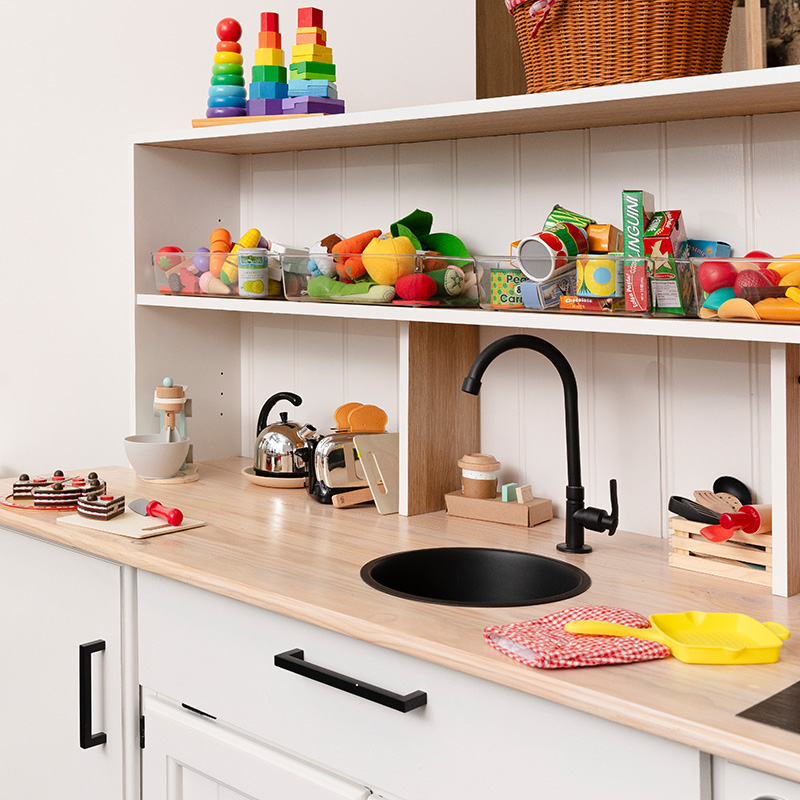
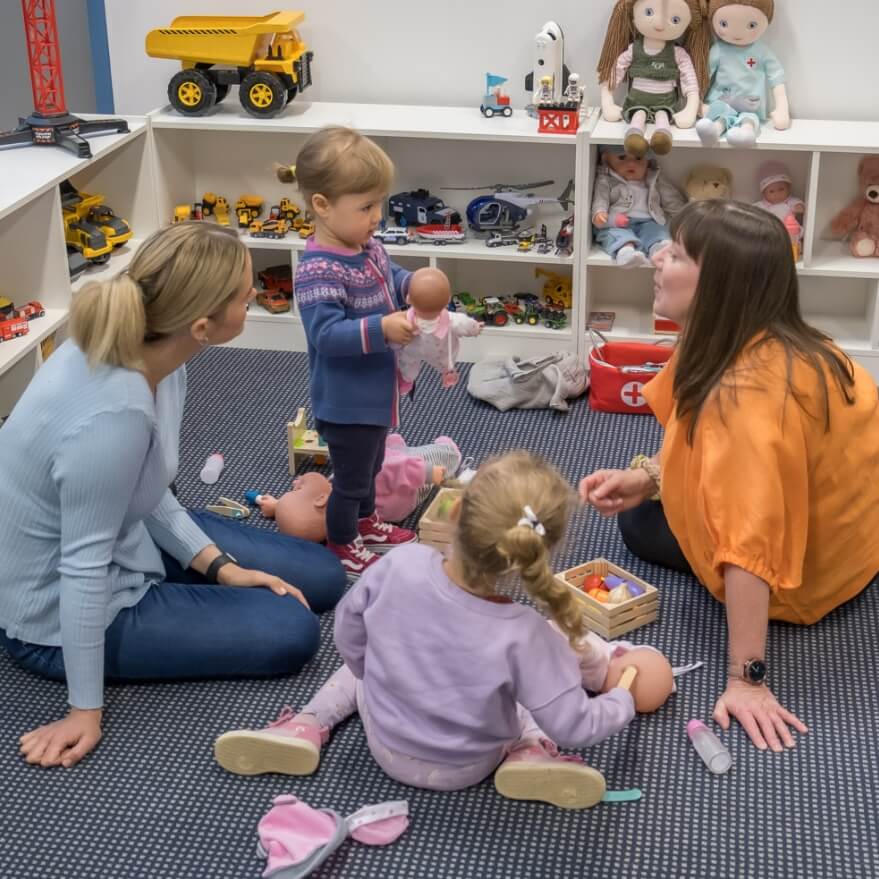
Filial Therapy
(Parent-Child Therapy)
Filial Therapy, involving all the family, enables the strengthening of communication and connection between parents and children, through play.
Filial Therapy is a unique approach to therapy which focuses on the child-parent relationship enabling parents and carers to act as the change agents for reducing difficulties. Developed in the 1960’s by Dr Bernard and Dr Louise Geurney it has shown to be effective for helping children and strengthening families.
In Filial Therapy parents/carers receive training, supervision, and support as they learn what their children may be communicating through their play. Parents/carers will learn to conduct a special play session with their own child. Filial Therapy involves am intake, assessments, demonstration, training phase, supervised parent-child play sessions, and an end phase where parents/carers learn ways to generalise newly obtained skills into everyday life. Post assessments are conducted to allow a parent/carer to acknowledge their own growth in learning. Parents/carers are engaged as partners in the therapeutic process, and whether filial therapy is used to eliminate serious problems, or as an educational tool to help reduce or prevent problems, most parents/carers find the experience rewarding. Children also enjoy the opportunity to play and share with their parents/carers in special play time.
Filial Therapy can be tailored to meet your family’s unique needs with scheduling.
Autplay®
Autplay® is a neurodiversity affirming framework for applying play therapy to support developmental delay, mental health and difficulties for neurodivergent children.
Autplay® is an integrative family therapy approach designed for children and adolescents 3-18 years who may be autistic, neurodivergent, and/or have developmental or physical disabilities. This includes attention deficit disorder, learning disorders, sensory integration needs, and social anxiety. Autplay® is focussed on understanding the needs related to mental health/life issues such as trauma, depression, anxiety, sensory challenges, and the parent/child relationship.
The typical Autplay® process involves parent or carer completing some inventories, observations of child playing and parent/carer playing with child. This is followed by meeting with parent or carer without the child where priority goals and structured interventions are discussed and planned.
Interventions will then commence and length of intervention, including reviews are determined based on referral reason and unique needs of the child and family.
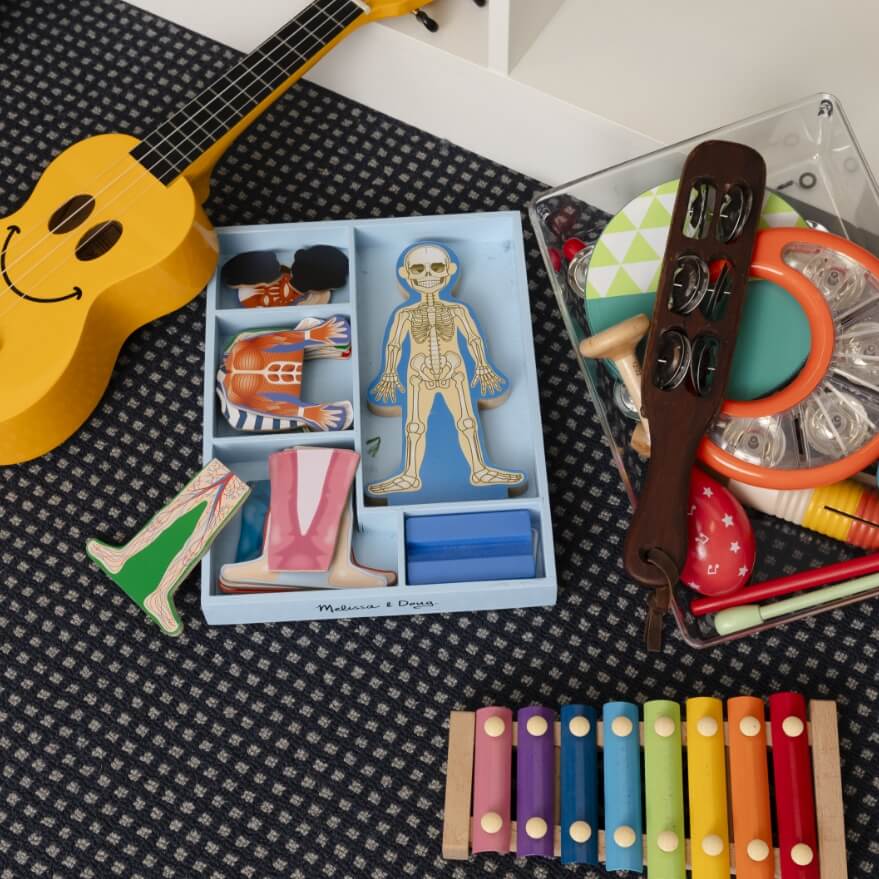
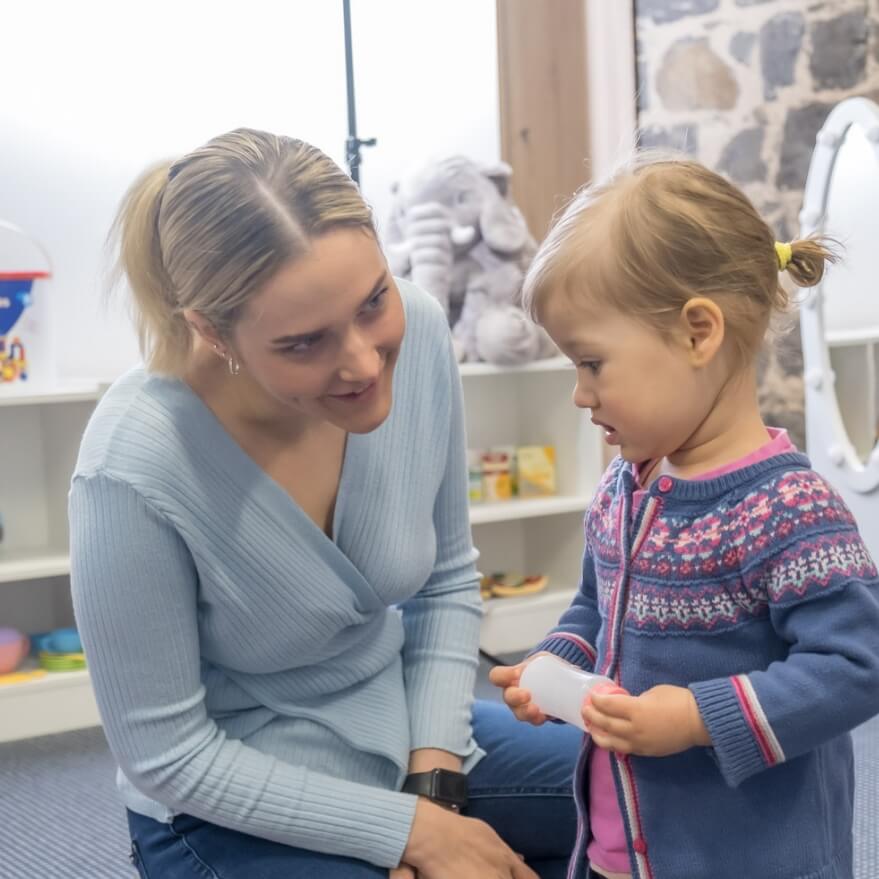
Theraplay®
At Attach Therapy we may integrate Theraplay® activities in play therapy interventions.
Theraplay® is an evidenced-based, attachment-focused intervention utilising non-symbolic, interactional play to re-create experiences of secure attachment formation between parent/carer and child.
At Attach we incorporate Theraplay® principles and activities as required in play therapy interventions to strengthen the relationship between child and parent/carer. A Marschak Interaction Method (MIM) may be undertaken following intake to assess the child-parent relationship, and a feedback session provides the parent/carer with domains of strengths and domains where support may be required. The play therapist will model some activities and incorporate them within the play therapy intervention.
Theraplay® activities are pivotal in helping the child develop felt safety by experiencing earlier tough interactions in new ways, helping to increase trust and build a positive sense of self. Theraplay® builds the relationship between child and parent/carer and is underpinned by attachment theory and shows that the parent-child relationships are the most significant and effective component for change.

